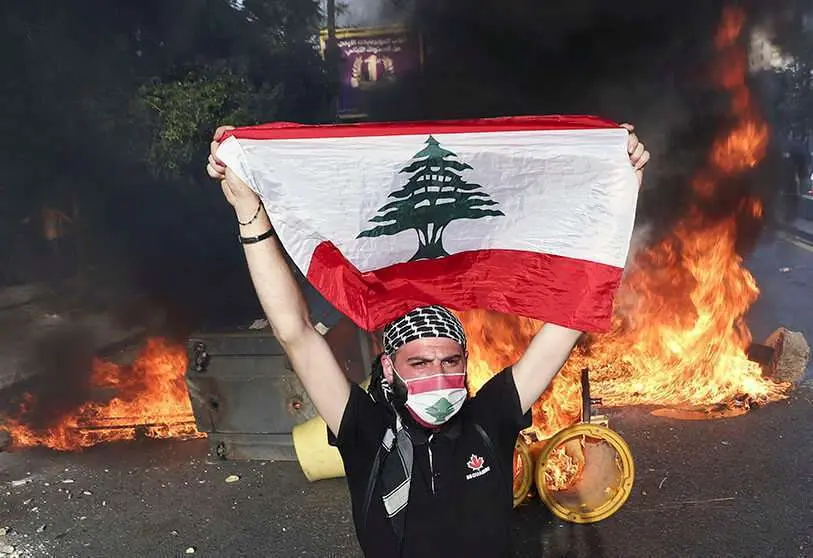Lebanon: Civil society in the face of crisis

Nothing works in cedar country anymore. Today the Lebanese no longer live, they survive. For several months now, Lebanon has been plunged into an unprecedented financial crisis. According to the latest statistics, 45% of the population now lives below the poverty line, a situation that predated COVID-19.
Last October, the state wanted to impose a tax on communications through WhatsApp which aroused the anger of the people. A huge mobilization was organized against the government and that was the last straw. Corruption, incompetence--the Lebanese political class has never been so unpopular and criticized. The collapse of the Lebanese currency has led to a serious socio-political crisis. While the exchange rate of the banks is still 1,500 pounds to the dollar, the reality is that that same dollar is worth 9,000 pounds. To keep to the figures, the rate of inflation that has affected food products in recent months now stands at 72%. The pictures of the Lebanese taken in front of their empty fridges have gone around the world and have shocked the rich.
The IMF has urged the Lebanese government to find a way out of the crisis and agree on a rescue plan, but the political rifts are deep and accompanied by social fragmentation. Washington accuses Hezbollah, an ally of Tehran, and a heavyweight in Lebanese politics of "diverting billions of dollars that should have gone into government coffers. These were the words of the American ambassador to Lebanon, Dorothy Shea, to a Saudi television station. Statements that have been widely criticized and that give an international dimension to this crisis with its innumerable ramifications.
At national level, this has led to massive layoffs and lower salaries. The daily life of the Lebanese goes from one deprivation to another. The power cuts also remind people of the sad years of the war. The traffic lights are off. Nothing works in beautiful Beirut that made the whole Middle East and even beyond dream.
The year 2020 is the year in which the country celebrates its centenary. A very sad anniversary. Lebanon is now facing its destiny. Not only is it haunted by a financial crisis, after having lived through a long fratricidal war (1975-1990), but its very existence, which we are talking about today. What is a country worth if its people cannot eat and commit suicide from hunger? Ali Al-Haq was 60 years old when he turned his gun to his temple and shot himself in full view of everyone and in the street. Unfortunately, this is not an isolated case and there were several suicides.
Lebanon is suffocating, no one is capable of leading it anymore. At the moment the political class is tearing itself apart; Alain Bifani, director general of the Ministry of Finance and in charge of negotiations with the IMF has left his post. Shops are closing in Beirut, Tripoli and many other Lebanese cities. The lack of liquidity is blocking the whole country and taking its people hostage.
After a respite that lasted the duration of the pandemic, popular demonstrations and uprisings are resuming. Tripoli has become the centre of the protest. Here people say they would rather die of coronavirus than starvation. Crime has also reached record levels due to unemployment and the great desperation of the inhabitants.
In Lebanon we talk about a "banking elite" that is out of control. The outflow of capital has been denounced until recently and the country is going from one financial scandal to another. The IMF has made its aid conditional on the introduction of capital controls, but this is not a foregone conclusion either... On July 13, the International Monetary Fund reiterated its request and wants clear answers: "It is very important that the authorities unite around the government's plan. For our part, we stand ready to work with the authorities to improve the plan where necessary," said Athanasios Arvanitis, IMF deputy director for the Middle East and Central Asia. For the record, Finance Minister Ghazi Wazni said the talks with the IMF were suspended. This rescue package seems to be well compromised and difficult to implement. The different factions of the political class are splitting up, and the clan wars have not finished claiming victims.
Faced with the government's inability to find a way out of the crisis, civil society has organized itself. Food and medical care are distributed by volunteers and funds have been raised to help struggling businesses. The Lebanese do not lack imagination and bartering has become a new way of exchanging goods and merchandise. Facebook pages have been created for this purpose and others to encourage local trade. This option took off considerably too quickly.
The Lebanese are trying hard to get out of this bad situation, but what is certain is that they also, and above all, need their government, which is unable to solve their problems at the moment.

